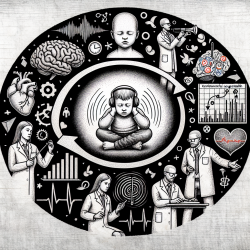Introduction
Adverse Childhood Experiences (ACEs) are a critical public health issue, influencing long-term health outcomes. The recent study, "First-time exploration of adverse childhood experiences among adults in Delaware using BRFSS data: A cross-sectional study," provides groundbreaking insights into ACEs and their implications. As practitioners focused on creating positive outcomes for children, understanding and integrating these findings into practice is vital.
Understanding the Impact of ACEs
The study highlights that nearly one in four adults in Delaware reported high ACE scores (three or more), with emotional abuse being the most common. High ACE scores correlate significantly with poorer health outcomes, including chronic conditions and mental health issues. These findings underscore the importance of trauma-informed care in addressing the needs of affected individuals.
Implementing Trauma-Informed Practices
Practitioners can enhance their skills by integrating trauma-informed approaches into their therapy sessions. Here are key strategies:
- Education and Awareness: Increase awareness about ACEs among colleagues and caregivers. Understanding the prevalence and impact of ACEs is the first step toward effective intervention.
- Screening and Assessment: Incorporate ACEs screening tools in assessments to identify children at risk. Early detection allows for timely intervention and support.
- Safe and Supportive Environment: Create a safe space for children to express themselves. A supportive environment fosters trust and encourages healing.
- Collaborative Care: Work with other professionals, such as mental health specialists and educators, to provide comprehensive care. Collaboration ensures that all aspects of a child's well-being are addressed.
Encouraging Further Research
The study provides a foundation for further research into ACEs and their impact on health outcomes. Practitioners are encouraged to explore the following areas:
- Longitudinal Studies: Conduct longitudinal research to understand the long-term effects of ACEs and the effectiveness of interventions.
- Intervention Effectiveness: Evaluate the effectiveness of different trauma-informed interventions to determine best practices.
- Cultural Sensitivity: Investigate the role of cultural factors in ACEs and tailor interventions to be culturally responsive.
Conclusion
Integrating trauma-informed practices into therapy can significantly improve outcomes for children affected by ACEs. As practitioners, embracing these approaches not only aids in healing but also empowers children to overcome adversity. By prioritizing evidence-based decisions, we can contribute to a trauma-informed society, fostering resilience and well-being in future generations.
To read the original research paper, please follow this link: First-time exploration of adverse childhood experiences among adults in Delaware using BRFSS data: A cross-sectional study.










